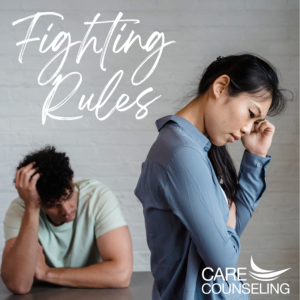Fair Fighting Rules

Relational conflict often involves some form of fighting. It may look like heated disagreements that end nowhere, trigger reactive words that magnify emotional wounds, and uncontained strong emotions that can result in unhealthy coping or impulsive behaviors one later regrets.
While fighting is often viewed as a bad thing, the avoidance of conflict is not so healthy either. The key is to engage in fair fighting and utilize fair fighting rules. This helps provide a framework that helps serve as a model of engagement so that fighting is done in a way that is fair, feels safe, and is productive for all involved.
While you can take fair fighting rules and implement them in your own relationships, utilizing these with the support of a trained family or couples’ therapist is most effective. Here are six reasons why:
Therapy provides a structured safe space to fight fairly.
How many times have you wanted to address something with a partner only to hear things like “Now is not the time or place” or “Let’s not do this in front of [our kids/ our friends]”. Perhaps you set the matter aside only to completely avoid addressing it altogether. Regularly scheduled therapy sessions give you a set date/ time to address topics without avoidance.
Individuals are provided with support to process thoughts and feelings and identify the core conflicts.
Therapists can help couples and their partner(s) understand what they are experiencing and get beneath the surface emotion to identify core fears and vulnerabilities that show up in relationships. Often the little things that trigger strong emotions are a cumulative build-up.
Therapy helps contain strong emotions and set boundaries.
To have productive conflict, there need to be some ground rules in place. Common fair fighting rules include no yelling, taking turns while speaking, using respectful language, and using a time-out if needed.
Therapists are skilled to work with the four horsemen that show up: criticism, contempt, defensiveness, and stonewalling. By identifying these patterns, your therapist can help learn constructive ways to express anger and restore the health of unhelpful patterns that ultimately end many relationships.
Therapists help enforce good boundaries.
Establishing fair fighting rules and boundaries is one thing, but it may take professional support to help enforce these. Showing up drunk or high not going to lead to productive conflict. Derailing from established ground rules to where the space is feeling emotionally or physically unsafe is not conducive to good work. Your therapist may utilize the use of breaks to help each person calm down and then circle back with a plan to work with triggers. In some cases (e.g., when intimate partner violence is currently present), couples therapy may not be discontinued, and additional resources along with individual therapy may be recommended.
Therapists can help recognize and celebrate the wins.
In fair fighting, the focus is on a win for the relationship vs. winning the argument. It is important to recognize and celebrate these! The outcome could be painful but ultimately there is a win for the relationship when each person can have space to express where they feel heard and can come to a mutual understanding or compromise that resolves the presenting concern.
Written By: Charlotte Johnson, MA, LPCC



























